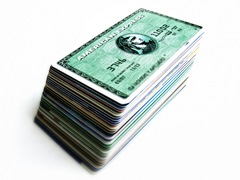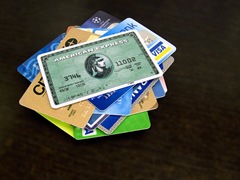Congress is about to pass “sweeping credit card legislation.” I don’t think it’s all that sweeping, and although overall I don’t particularly object to it, there are aspects of it that bother me.
 Reassuringly for us curmudgeons, the bill is hardly revolutionary, largely a collection of modestly worthwhile reforms and regulations. There are rules about how interest rates can be raised and late fees charged. Most people will not notice any effects, and even those that do will probably forget about it in a year or two.
Reassuringly for us curmudgeons, the bill is hardly revolutionary, largely a collection of modestly worthwhile reforms and regulations. There are rules about how interest rates can be raised and late fees charged. Most people will not notice any effects, and even those that do will probably forget about it in a year or two.
However, there is one aspect of the would-be law that is significant both in its impact on a small slice of the public and as a sign of the times. The just-passed Senate version of the bill outlaws credit cards issued to those under 21. The House version set the minimum age at 18. That’s a big difference in my book.
Read more »
It’s graduation season again. Time to write about how totally screwed today’s college graduates are. They didn’t learn enough in school, certainly not enough about personal finance, they owe amazingly large amounts of money,  and they have bleak employment prospects. (Note to college seniors: anybody over 30 who says they wouldn’t trade places with you is lying.)
and they have bleak employment prospects. (Note to college seniors: anybody over 30 who says they wouldn’t trade places with you is lying.)
This year, there is hand-wringing particularly over the debt part. Bargaineering asked last week if students should have credit cards at all. The credit card reform act passed by the House last week would ban the issuing of credit cards to those under 18. If that survives the Senate, it will mean that credit cards will join such things as alcohol that we expect young people to learn about on their own after they leave home. (Will there be big burly guys at the door of the bank checking ID?)
There can be no doubt that young people can do dumb things with credit cards. Nor do I doubt that they are more likely to do so than older Americans. In the immortal words of that guy who had the job before Obama “When I was young and foolish I was young and foolish.”
Read more »
Normally, I have the criticizing personal financial gurus business all to myself. I like to think this is because I am the only one who sees the faults in their advice, or alternatively, that I am the only one bold enough to say the emperor has no clothes on. But it is also possible I am the only one who takes them seriously enough to bother writing about what they say.
This is not the case with Suze Orman’s recent advice on credit cards and emergency funds. It took a while, but quite a few people thought it was important enough to comment on critically. Welcome to my world.
It started with Orman’s March 1 Suze Scoop. There’s been some disagreement as to what exactly she told her readers to do, so if you are as obsessed about this stuff as I am, click on that link and come back when you are done. In the event that you have more balance in your life, I’ll quote the first two paragraphs.
If you have an unpaid credit card balance and not much saved up in emergency savings I need you to listen up. My advice has changed.
I want you to only pay the minimum due on your credit card balance and instead make it your top priority to build as much of an emergency cash fund as you can.
Read more »
Given all the attention generally paid to mortgages, and especially recently, you might think that the basic principles might be widely understood. Alas, no. See, for example, and I cite it only as a typical example, Suze Orman’s 2009 Action Plan, in which she addresses the advisability of borrowing using a  HELOC (Home Equity Line of Credit, essentially a second mortgage on your house) to pay off credit card debt.
HELOC (Home Equity Line of Credit, essentially a second mortgage on your house) to pay off credit card debt.
Do not do this. Even if you have enough equity to keep your HELOC open, this is a dangerous mistake. You are putting your house at risk. When you borrow from your HELOC, your home is the collateral. [page 30.]
That has a strong, almost visceral, intuitive appeal. And as strident as Orman is, she is fairly typical in her warnings against “putting your house at risk.” (See this from the Times a while back.) But it is pretty poor advice for many, probably most, people.
Read more »
A few things too small for posts of their own have been cluttering up my (virtual) desk.
CreditMattersBlog today has a post on a column a few weeks ago in the Wall Street Journal by our friend Brett Arends on using your credit cards to raise money for an emergency fund. It’s a stupid as it sounds. The column, I  mean, not the blog post. I have a rule not to pick on the same guy twice in a week, so I will keep from saying anything bad about Arends. I’ll just give you a link to where somebody else does it. (Note to any WSJ editors reading this: I would be happy to do Arends’ job for whatever you are paying him.)
mean, not the blog post. I have a rule not to pick on the same guy twice in a week, so I will keep from saying anything bad about Arends. I’ll just give you a link to where somebody else does it. (Note to any WSJ editors reading this: I would be happy to do Arends’ job for whatever you are paying him.)
CreditMattersBlog apparently noticed the Arends piece from a post by Liz Pullman Weston at MSN Money with the (for me) irresistible title “Why Suze Orman is Wrong – Again”. In case you missed it, good ol’ Suze put out some advice on March 1 that caused quite a buzz.
I want you to only pay the minimum due on your credit card balance and instead make it your top priority to build as much of an emergency cash fund as you can.
Read more »
 Reassuringly for us curmudgeons, the bill is hardly revolutionary, largely a collection of modestly worthwhile reforms and regulations. There are rules about how interest rates can be raised and late fees charged. Most people will not notice any effects, and even those that do will probably forget about it in a year or two.
Reassuringly for us curmudgeons, the bill is hardly revolutionary, largely a collection of modestly worthwhile reforms and regulations. There are rules about how interest rates can be raised and late fees charged. Most people will not notice any effects, and even those that do will probably forget about it in a year or two. 


